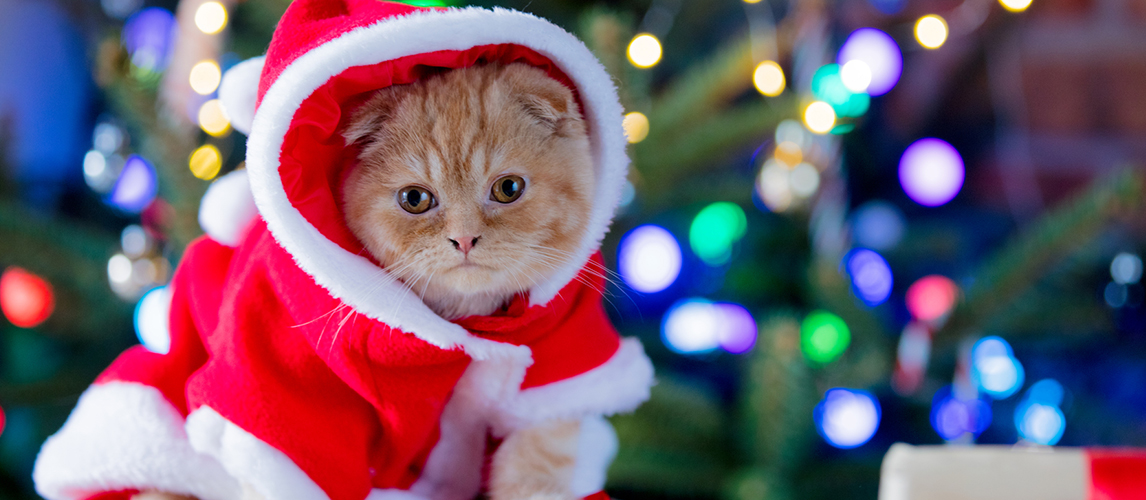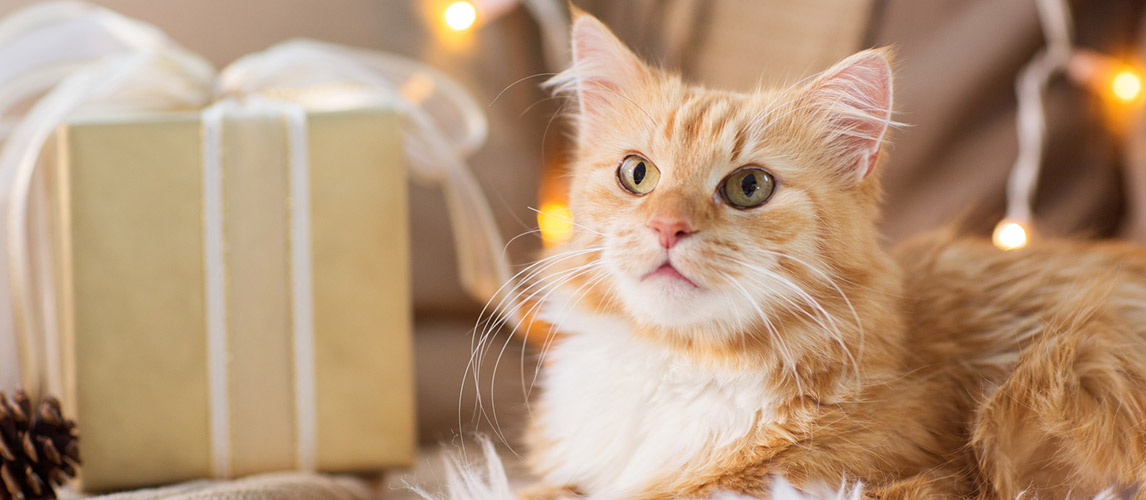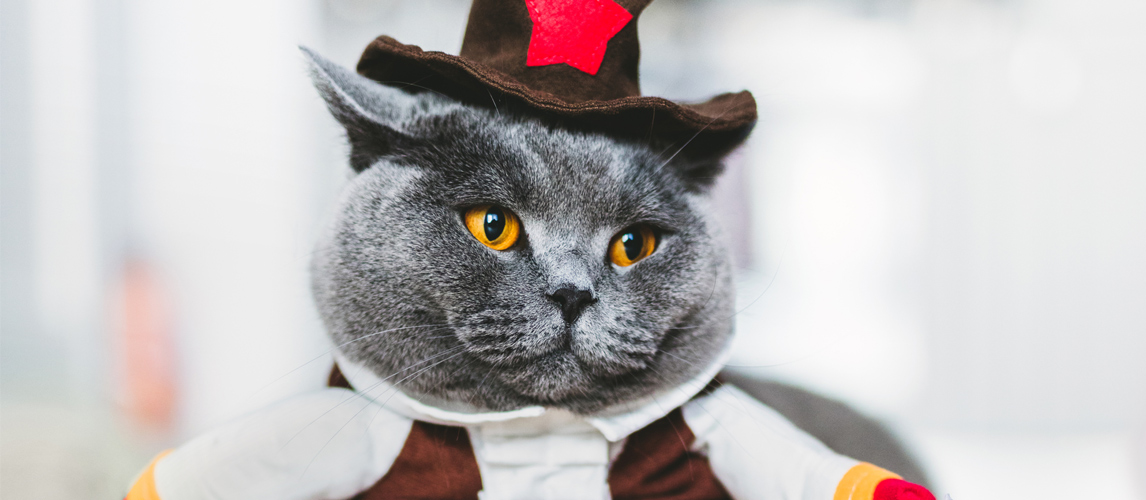Owners of cats will admit that cats are just as much a member of their family as any human. Bearing this in mind means that they are integral to the enjoyment of the holiday season. However, with the holiday season comes a whole host of risks that owners may not be aware of in terms of their cat’s safety.
Here are our top ten tips to ensure that your cat stays safe throughout all the holiday cheer, leaving you to be able to let your hair down with no undue stress.
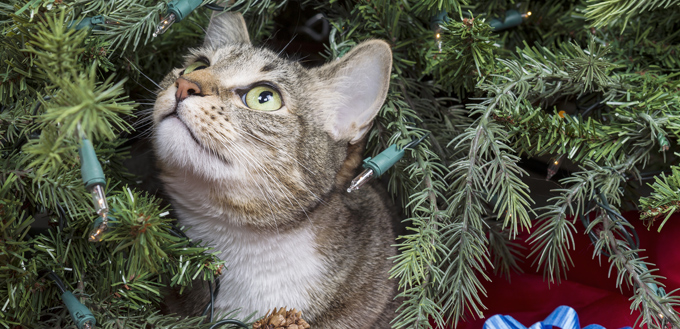
Put Holiday Plants Where Cats Can’t Reach, or Avoid All Together
This is perhaps a top tip for all cat owners that seems to slip off the radar. So many plants that are around the home at Christmas and over the holiday are actually incredibly poisonous to cats. For example, the beautiful red flowers of Poinsettias can be toxic to our feline friends. Mistletoe is another culprit that can make your cat extremely sick. Both can unfortunately lead to death, though in some cases cats can be lucky and simply suffer from an upset tummy but these can develop into more serious illnesses that are very painful to your furry friend.
If, however, you can’t find a place that is safe from your cats to reach and you absolutely have to have mistletoe or a poinsettia in your home for it to be Christmas, a good work around is simply to buy a good quality silk version. Whilst you may know that they are fake, silk flowers can fool most people from afar and can look fantastic for much longer than the real versions anyway.
If you are given a gift of a poinsettia or mistletoe and you feel you have to put it out to be polite, be wary of any leaves that drop or are about to drop as these are often the leaves that cats get to and ingest unwittingly.
You May Also Like: How to Keep Cats Away from Plants
Make Your Tree as Stable as Possible
No home that celebrates Christmas is complete without a Christmas tree that is decorated with a whole load of decorations. However, for your cat, your tree is like the metaphorical moth to a flame and can be mesmerizing. So much so that they feel like they absolutely have to climb it and investigate all the trinkets and baubles that adorn it. This can obviously be a bit of a danger for your tree as, whilst cats are light, they can pull the tree over and cause themselves harm – either by the weight of the tree injuring them or a bauble breaking and cutting a limb.
There is an easy way round this however, and all it takes is five more minutes care when putting your tree up. Each and every year, when putting your tree up, ensure that you are using a stand that fits your tree properly so that its center of gravity is that much lower making the tree that much more stable. Having legs that are much wider than the base of the tree as well as being very heavy will help in the quest to stabilize your tree even more. It really can be very perilous for your cat if all you do is prop your tree up against a wall. A stand may be an extra investment, but it will save you money in the long run in broken decorations and perhaps some pretty hefty vet bills.
Don’t Buy a Tree That Uses Preservatives
For Christmas trees to be able to promise to be the non drop variety, festive supporters invariably put a preservative in the water for their tree so as to make sure they last the long month of Christmas and New Year. However, these are sadly harmful to cats and so cat owners should try to steer clear of using them. Luckily, there is a simple way round it and that is just to top up your tree’s water regularly with water that is both fresh and clean. It will do exactly the same job as the additives that trees often come with and at the same time, you stop your cat from accidentally ingesting harmful chemicals that cause them a very bad stomach upset or worse.
Put Glass Baubles Out of Reach
Christmas decorations can be truly beautiful and none more so than glass baubles that are intricate and delicately decorated. Unfortunately, they are very interesting to cats who will want to play with them until they fall off the tree so they can play hit and chase with it. To stop this from occurring, think about putting your favorite glass baubles out of reach and high up the tree. On the bottom branches of your tree, try putting the plastic baubles you have which are safer for your cat to get at and play with.
Unfortunately, glass baubles come rife with a whole host of risks should your cat knock one down. They tend to be incredibly fragile so that they can break into a million little pieces that your cat could step on with his or her paws and cut themselves. Additionally, some cats could even ingest these tiny shards and that can be extremely dangerous. These tiny shards can cause your cat to suffer from an internal injury that will need a vet to investigate, which can not only be costly, it can be very painful to your cat too. Internal injuries can cause dangerous internal bleeding which can lead to further infections that are difficult to treat.
As well as putting plastic baubles and decorations lower down your tree, consider putting a barrier around your tree that will stop your cat even getting close to it. Prevention is key when such dangerous consequences can come about.
Think Twice About Where Your Lights Are
Christmas lights and fairy lights are a key decoration at Christmas – there is no denying that. Unfortunately, there is no denying that cats find them fascinating. Whilst this can be irritating to owners if they pull them down – either when they are on a tree or framing a window, they can also be dangerous to your cat too. Cats have been known to chew on the bulbs and wires themselves, which can have obvious consequential risks in terms of exposed electrical currents that cause your cat harm. Additionally, your cat is at risk of cutting his or her mouth and gullet when chewing on glass bulbs that will shatter in his jaws. Like broken glass baubles, the shards that are created can be ingested and go on to cause your cat internal injuries as well. By keeping your lights somewhere that your cat cannot get to, hopefully you will avoid any unnecessary vet trips or at worst, surgery.
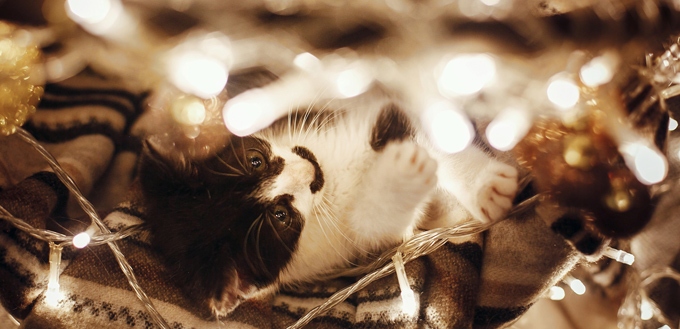
Consider Where Your Electrics Go to and From
Like the wires on your lights, all electrical hazards can be hazardous to cats. If possible, make them totally inaccessible to your feline friend so as to avoid the risk of electrocution or giving them a painful electric shock. At worst, electrocution can obviously be deadly, but your cat does not know the risk involved when playing with a wire cord. Instead, it just looks an incredibly tempting toy for them fuss with, so try to avoid the temptation for them by putting them out of reach. It may look unsightly, but taping down the wires can be a good way round them playing with any electrical cords.
You may also like our article: Cat Chew Cords: Why Cats Do This And How To Prevent It
Give Thought to Where and When Your Light Candles
Many of us like to set a warm and cosy atmosphere around Christmas time by lighting candles. While lighting them around your home certainly creates a warmth and festive feeling, cats also love candles and playing with them too. In particular, cats love playing with lit candles. Bearing that in mind, remember where and when you have lit candles to ensure that you never leave your cat alone in a room with one that could burn them. In addition to them being burnt, this obviously causes a huge fire risk to your home having a lit candle knocked over.
One long term solution, other than constantly blowing out candles every time you leave a room, is to buy one of the many battery operated candles on the market that give a very good impression of a real candle and its flame. Though, depending on your cat, these can also be a feline hazard around the holidays.
Beware of Using Antifreeze and Other Strong Chemicals
The weather often takes a big dive around the holidays causing car owners to use antifreeze to clear up their windshields when they have frozen over. However, antifreeze is incredibly toxic and can sometimes leak on driveways, which is a risk to pets including cats that roam free and could very well ingest some of the chemicals. What makes this problem worse is that around the holidays we all have more guests which ups the chances of more antifreeze leaking onto our driveways and sidewalks. The best way round this problem, other than banning friends from your house that use such chemicals, is to check your driveway regularly for any small puddles or collections of antifreeze that may have built up. If found, clear them up and get rid of any waste somewhere that your cat won’t be able to reach.
Be Aware That the Time of Year Could Make Your Cat Prey to Some Animals
This may sound extreme to some, especially those that live in built up urban areas but cat owners really need to be aware that with the colder weather comes the increased risk that your cat could become prey to some bigger animals. Due to the dip in temperatures, other food sources become more rare and so, especially if you live in a rural area, coyotes, eagles and cougars could all become an issue as your cat may become an attractive proposition for them. It isn’t unheard of for a even a medium sized cat to be carried off by larger birds of prey. Bearing this in mind, stay with your cat if they go outside to use the bathroom, or simply keep them as indoor cats during the Winter and holiday season.
Salt and Grit Can Be Harmful to Cats and Pets
Around the holiday time of year, when freezing temperatures and snow can cause havoc with the roads, it isn’t just antifreeze that can be harmful to your cats. Sidewalks are often scattered with salt and grit to keep them safe for walking on and the chemicals within them can be just as toxic to cats as antifreeze can be. What’s worse is that the grit can stick to a cat’s paws so that even if they do not ingest the salt and grit directly from the pavement, they can still have a reaction to particles that they lick off their paws during their daily cleaning regime. To get round this problem, either keep your cat indoors during Winter or get into the habit of wiping down their feet when they come back into your home. This is good practice as even if your cat does not lick his or her paws to clean their feet, any chemical residue left on their paws from the sidewalk or elsewhere can be an irritant for your cat’s sensitive skin.
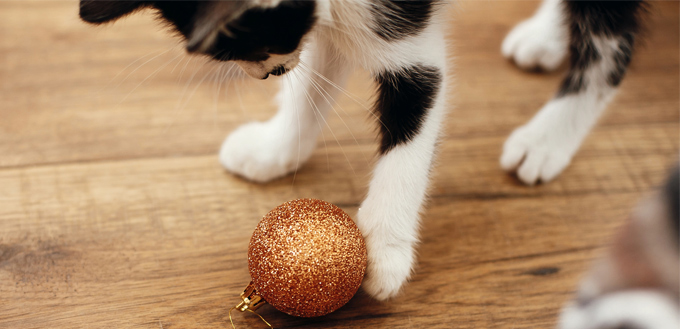
Holiday Season: The Bottom Line for Cats
Seeing this long list of risks can be very overwhelming to devoted cat owners, but often these risks are easily mitigated so that there should be no cause for concern. All it takes is a little more thought every now and then with regards to foreseeing what your cat or kitten could do with new decorations or the changing climate and your home will remain a cat safe zone.
Related Post: Best Cat Costumes
Sources:
- Holiday Safety Tips, ASPCA
- Krista Williams, BSc, DVM, Holiday Safety Tips for Cat Owners, VCA Hospitals
- Winter Holiday Pet Safety, American Veterinary Medical Association


